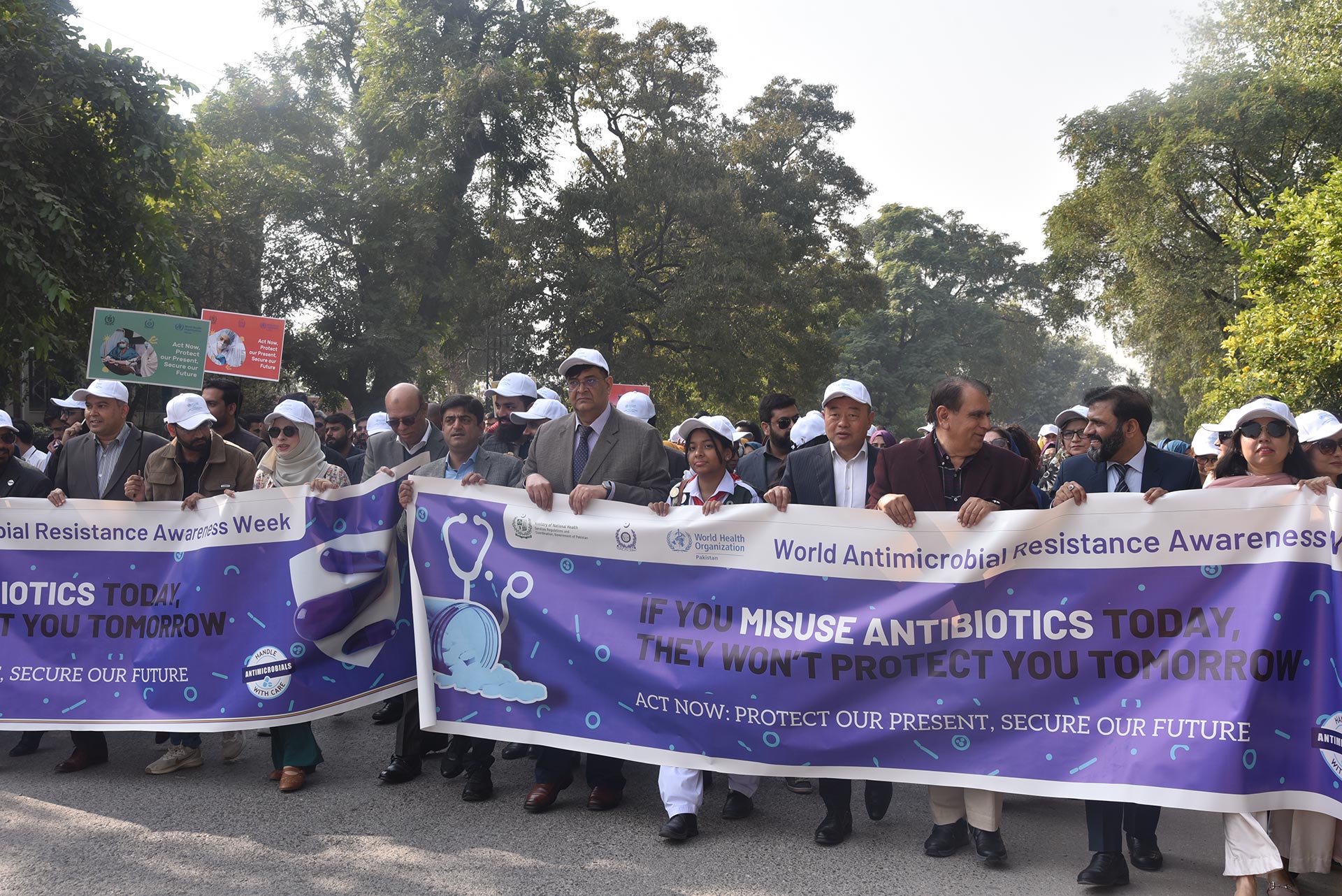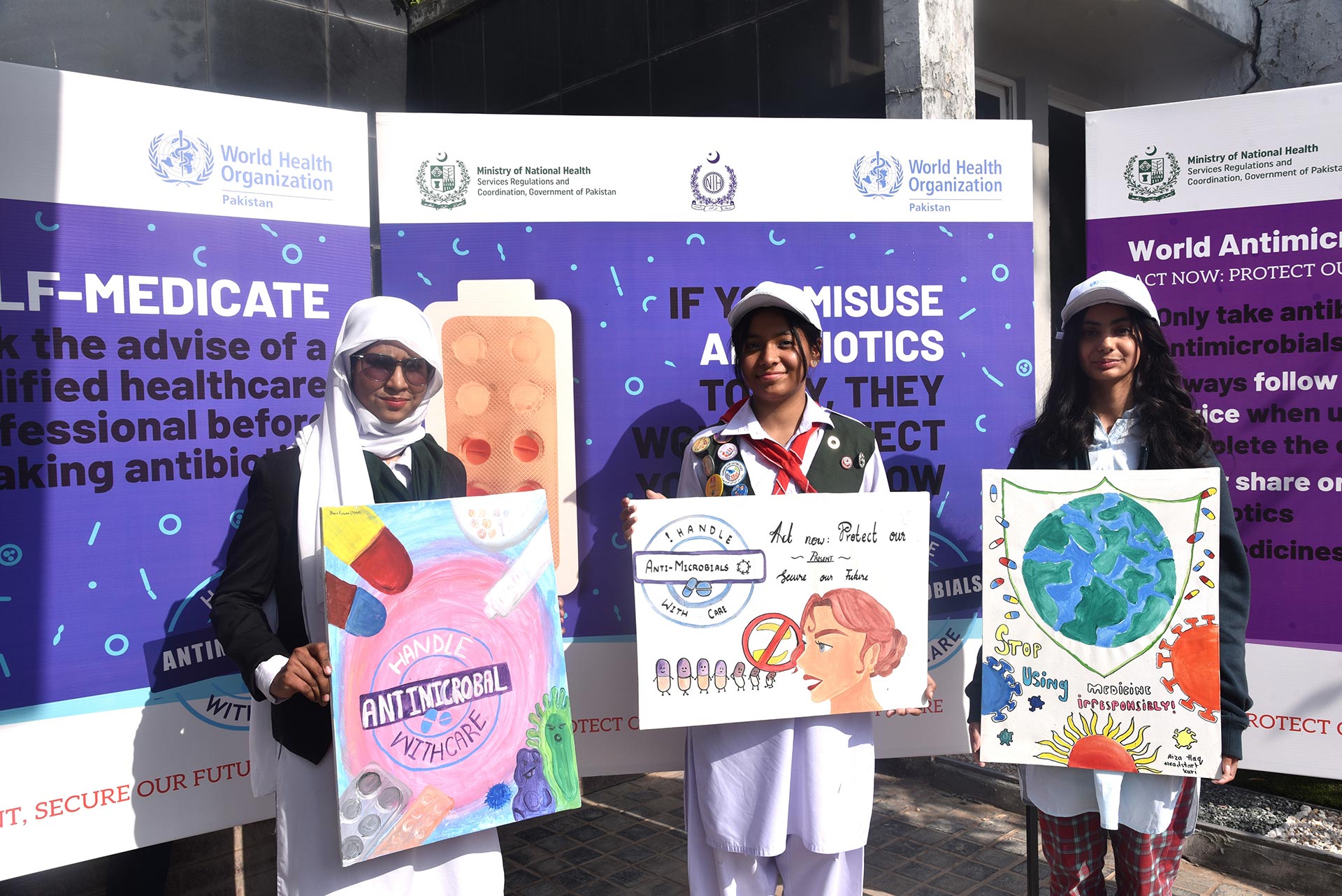The National Institute of Health and the World Health Organization announce the Eastern Mediterranean Region’s first national priority pathogen list to combat antimicrobial-resistant infections.
 The National Institute of Health and WHO lead a symbolic walk to start Antimicrobial Resistance Awareness Week. Photo credit: WHO/Sara Akmal.
The National Institute of Health and WHO lead a symbolic walk to start Antimicrobial Resistance Awareness Week. Photo credit: WHO/Sara Akmal.
18 November 2025, Islamabad, Pakistan – On the occasion of World Antimicrobial Awareness Week, Pakistan’s National Institute of Health (NIH) and the World Health Organization (WHO) announced the first national priority pathogen list for antimicrobial resistance (AMR) in WHO’s Eastern Mediterranean Region. The objective: to combat the global threat of antimicrobial-resistant infections, which cause each year over 200,000 directly attributable and associated deaths in Pakistan. The crisis has been accelerated by the overuse and misuse of antibiotics in human health, agriculture, and veterinary practices.
The list was announced during an Antimicrobial Resistance Awareness Walk co-organized by NIH and WHO to call for individual and collective action to tackle a global threat that, without urgent measures, could cause 63 000 directly attributable deaths and 262 000 associated deaths in Pakistan by 2050.
“Combating antimicrobial resistance requires a comprehensive One Health approach that addresses the interconnectedness of human, animal and environmental health. Factors driving resistance in Pakistan include irrational prescribing practices, over-the-counter sales of antibiotics, poor infection prevention and control practices, and the misuse of antimicrobials in agriculture and livestock,” said NIH Chief Executive Officer, Dr Muhammad Salman.
Globally, antimicrobial resistance could lead to 10 million deaths annually and a cumulative loss of US$100 trillion by 2050 if urgent measures are not taken.
Pakistan’s national priority pathogen list is among the first 8 pathogen lists globally and represents an important milestone in addressing a global public threat that impacts health systems, food security, the environment and economies.
The World Antimicrobial Awareness Week (WAAW) 2025 theme, “Act Now: Protect Our Present, Secure Our Future”, calls on everyone – policy-makers, health workers, farmers, community leaders, the media and the general public – to step up and take action.
 Winners of the student poster competition co-organized by NIH and WHO to raise awareness about the use of antibiotics. Photo credit: WHO/Sara Akmal.
Winners of the student poster competition co-organized by NIH and WHO to raise awareness about the use of antibiotics. Photo credit: WHO/Sara Akmal.
Students encourage responsible use of antibiotics through art
As part of World Antimicrobial Resistance Awareness Week, WHO and the NIH handed over awards to winners of a student poster competition aimed at raising awareness about the importance of avoiding the misuse and overuse of antibiotics. In their own words and through their designs, these talented children explained why our daily actions can make a difference in protecting our present and their future.
“Antimicrobial resistance is not a distant problem. It is happening now. As we speak, every 5 minutes, 2 people die due to antimicrobial resistance or associated reasons in Pakistan. These deaths are preventable,” said WHO Representative in Pakistan, Dr Luo Dapeng. “Today, talented children explained to us through their art why our daily actions can make a difference in protecting our present and their future. Let us not fail them”.
For additional information, please contact:
José Ignacio Martín Galán, Head of Communications, WHO Pakistan,
Maryam Yunus, National Professional Officer – Communications, WHO Pakistan,
About WHO
Founded in 1948, WHO is the United Nations agency that connects nations, partners and people to promote health, keep the world safe and serve the vulnerable. We work with 194 Member States in 150+ locations – so everyone, everywhere, can attain the highest level of health. WHO has been present in Pakistan – a founding member of the Organization – since 1960. For more information, visit https://www.emro.who.int/countries/pak/index.html. Follow WHO Pakistan on Twitter and Facebook.








